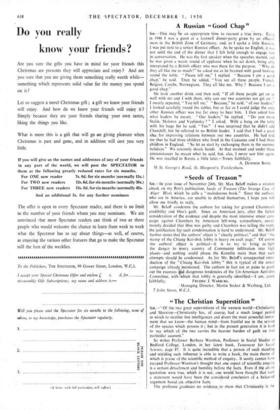A Russian Good Chap "
SIR,--This may ,e an appropriate time to recount a true story. Early in 1946 1 was a guest at a farewell dinner-party given by an Officers' mess in the British. Zone of Germany, and, as I spoke a little Russian, I was put next to a senior Russian officer. As he spoke no English, it was not until the end of the dinner that I felt bold enough to engage him in conversation. He was the first speaker when the speeches started, and he was given a warm round of applause when he sat down, being ably interpreted by a British officer who was there for the purpose. " Why do they all like me so much?"-he asked me as he beamed with good humour round the table. " Please tell- me," I replied. " Because 1 am a good chap," he said. Then he added, " You see all these people, French, Belgian, Czechs, Norwegians. They all like me. Why ? -Because I am a good chap."
He took another drink and then said, "If all these people get on so well with me and I with them, why can our two countries not get on ?" I merely repeated, " You tell Inc." " Because," he said, " of our leaders." 1 looked carefully round the tables, but as far as I could judge the only other Russian officer was too far away to hear him. I then asked him what leaders he meant. " Our leaders," he replied. "Do yoti mean Stalin, Molotov and Vyshinsky ? " I asked. With a bang on the table with his huge fist he said, " Yes." 1 was surprised that he didn't add Churchill, but he referred to no British leader. I said that I had a good idea for improving relations between our two countries. He had told me that he had three children who lived in the Caucasus and I hid three children in England. " So let us start by exchanging them in the summer holidays." We solemnly shook hands. At that moment and under those circumstances he meant what he said, but, alas, I never saw him again. He was recalled to Russia a little later.—Yours faithfully,






































 Previous page
Previous page